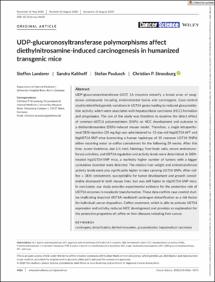UDP-glucuronosyltransferase polymorphisms affect diethylnitrosamine-induced carcinogenesis in humanized transgenic mice

UDP-glucuronosyltransferase polymorphisms affect diethylnitrosamine-induced carcinogenesis in humanized transgenic mice

| dc.contributor.author | Landerer, Steffen | |
| dc.contributor.author | Kalthoff, Sandra | |
| dc.contributor.author | Paulusch, Stefan | |
| dc.contributor.author | Strassburg, Christian P. | |
| dc.date.accessioned | 2023-02-07T12:26:28Z | |
| dc.date.available | 2023-02-07T12:26:28Z | |
| dc.date.issued | 28.08.2020 | |
| dc.identifier.uri | https://hdl.handle.net/20.500.11811/10616 | |
| dc.description.abstract | UDP-glucuronosyltransferase (UGT) 1A enzymes detoxify a broad array of exogenous compounds including environmental toxins and carcinogens. Case-control studies identified genetic variations in UGT1A genes leading to reduced glucuronidation activity, which were associated with hepatocellular carcinoma (HCC) formation and progression. The aim of the study was therefore to examine the direct effect of common UGT1A polymorphisms (SNPs) on HCC development and outcome in a diethylnitrosamine (DEN)-induced mouse model. Therefore, a single intraperitoneal DEN injection (20 mg/kg) was administered to 15-day-old htgUGT1A-WT and htgUGT1A-SNP mice (containing a human haplotype of 10 common UGT1A SNPs) either receiving water or coffee cotreatment for the following 39 weeks. After this time, tumor incidence, size (>1 mm), histology, liver-body ratio, serum aminotransferase activities, and UGT1A regulation and activity levels were determined. In DEN-treated htgUGT1A-SNP mice, a markedly higher number of tumors with a bigger cumulative diameter were detected. The relative liver weight and aminotransferase activity levels were also significantly higher in mice carrying UGT1A SNPs. After coffee + DEN cotreatment, susceptibility for tumor development and growth considerably decreased in both mouse lines, but was still higher in htgUGT1A-SNP mice. In conclusion, our study provides experimental evidence for the protective role of UGT1A enzymes in neoplastic transformation. These data confirm case-control studies implicating impaired UGT1A-mediated carcinogen detoxification as a risk factor for individual cancer disposition. Coffee treatment, which is able to activate UGT1A expression and activity, reduced HCC development and provides an explanation for the protective properties of coffee on liver diseases including liver cancer. | en |
| dc.format.extent | 10 | |
| dc.language.iso | eng | |
| dc.rights.uri | http://creativecommons.org/licenses/by-nc/4.0/ | |
| dc.subject | carcinogens | |
| dc.subject | detoxification | |
| dc.subject | diethylnitrosamine | |
| dc.subject | glucuronidation | |
| dc.subject | hepatocellular carcinoma | |
| dc.subject.ddc | 610 Medizin, Gesundheit | |
| dc.title | UDP-glucuronosyltransferase polymorphisms affect diethylnitrosamine-induced carcinogenesis in humanized transgenic mice | |
| dc.type | Wissenschaftlicher Artikel | |
| dc.publisher.name | John Wiley & Sons | |
| dc.rights.accessRights | openAccess | |
| dc.relation.eissn | 1349-7006 | |
| dcterms.bibliographicCitation.volume | 2020, vol. 111 | |
| dcterms.bibliographicCitation.issue | iss. 11 | |
| dcterms.bibliographicCitation.pagestart | 4266 | |
| dcterms.bibliographicCitation.pageend | 4275 | |
| dc.relation.doi | https://doi.org/10.1111/cas.14635 | |
| dcterms.bibliographicCitation.journaltitle | Cancer Science | |
| ulbbn.pubtype | Zweitveröffentlichung | |
| dc.version | publishedVersion | |
| ulbbn.sponsorship.oaUnifund | OA-Förderung Universität Bonn |
Files in this item
This item appears in the following Collection(s)
-
Publikationen (11)




